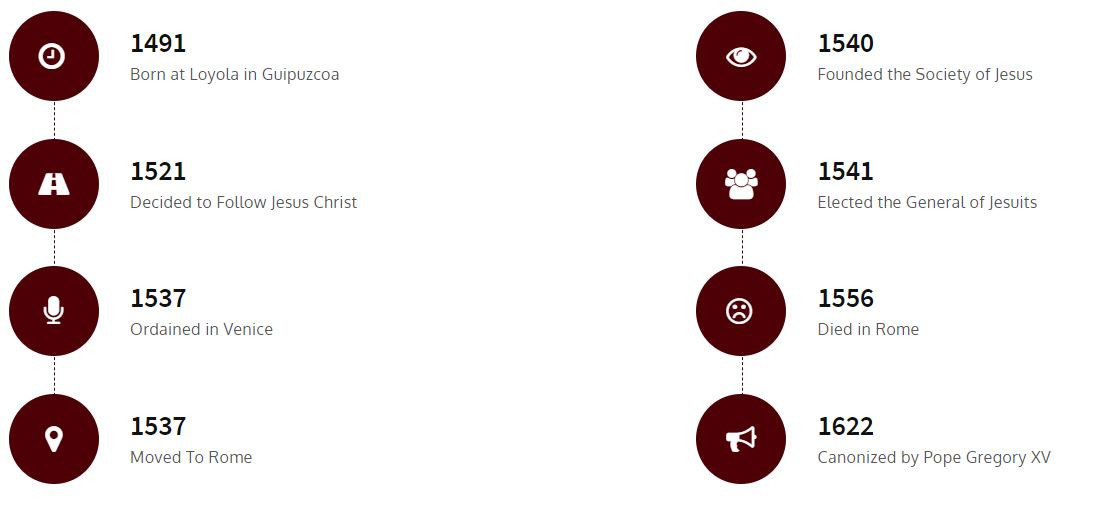Founder of the Society of Jesus
St.Ignatius of Loyola
The Jesuit Higher Education
It is world-affirming. It assists in the total formation of each individual within the human community. It includes a religious dimension that permeates the entire education. It is an apostolic instrument that promotes dialogues between faith and culture.
It pursues excellence in its work of formation and witnesses to the excellence. It insists on individual care and concern for each other. It emphasizes activity on the part of the student and encourages life-long openness to growth. It is value-oriented. It encourages realistic knowledge, of the world in which we live. It is a preparation for active life commitment. It serves the faith that does justice, seeks to form men and women for others and manifests a particular concern for the poor.
It provides adequate Personal care and concern for others. It celebrates faith in personal and community prayer, worship and service. it stresses lay – Jesuits collaboration and relies on a spirit of community among administrators, teacher, parents, alumni and benefactors in an atmosphere that promotes community.
It adapts means and methods in order to achieve its aims most effectively with a common vision and a common goal. It assists providing the professional training and on – going formation that is needed especially for administrators and teachers.
It is an apostolic instrument in the services of the church as it serves human society. It prepares students for active participation at the Church and the local community, for the liberation and service of others, taking Jesus as a model.
In the context of existing inequalities, injustices and dehumanizing poverty in contemporary society, the Jesuits are committed to challenge and change these oppressive structures through this college, towards the integral liberation of man in collaboration with Christians of different denominations, people of other religions and secular movements working with a similar vision.
Unfortunately, there are lots of people in the educational institutions who suffer from the Cain Complex and repeatedly ask the question: Am I my brother’s keeper? The scholarly privileged class has repeated this question for centuries. These student and teachers have been trained to think only about themselves and their own future. What is needed is that the college imparts such an education as to give witness to social justice. In short, education must be value-based and value oriented.
Educational enterprise should have faith and justice dimension to bring about the social change. It means that the educated and the educators should be committed to faith and justice.
The Jesuit educational institutions shape students into agents of social change preparing them for concerted social action and thus paving the way to mass movement which will bring about the desired liberation. They will in their admission policies actualize the preferential option for the poor by giving a privileged place to the weak who are poor economically and academically and form them as men for others stamped with the Ignatian hallmark of excellence and re-orienting itself in order to respond to the crying needs of today’s society. They will also promote research in those branches of arts, sciences and relevant pedagogy which would help build a just social order.
To achieve these Goals
For Jesuits
- An awareness and commitment to the vision.
- Involvement in neighbourhood ministry.
- Keep abreast of the changes on Higher Education.
- Commitment to higher education as a mission.
For Staff
- Training the staff to understand and accept the Jesuit vision and option
- Motivation to commit themselves to work for the poor
- Training in special skills related to integral formation
- Inclusion in planning and execution
- Encouragement in relevant research
- Provision for updating/ongoing formation
For Students
- Courses on Personality Development
- Courses on leadership
- Courses on Human Rights
- Involvement in outreach neighbourhood programme
- Participation at various human rights issues
- Training in critical thinking
- Creating environmental awareness
- Training in civics and duties of a citizen
- Training in multi-religious tolerance
- Training to work as a team
The Jesuits are aware of the great structural constraints they work under and so they have real apprehensions as to how effective their educational institutions could be in bringing about the desired social change through social action. Yet, responding to the greater call to be pioneers and prophets, they engage themselves in this momentous task of liberation with a readiness to pay the price the kingdom demands.


